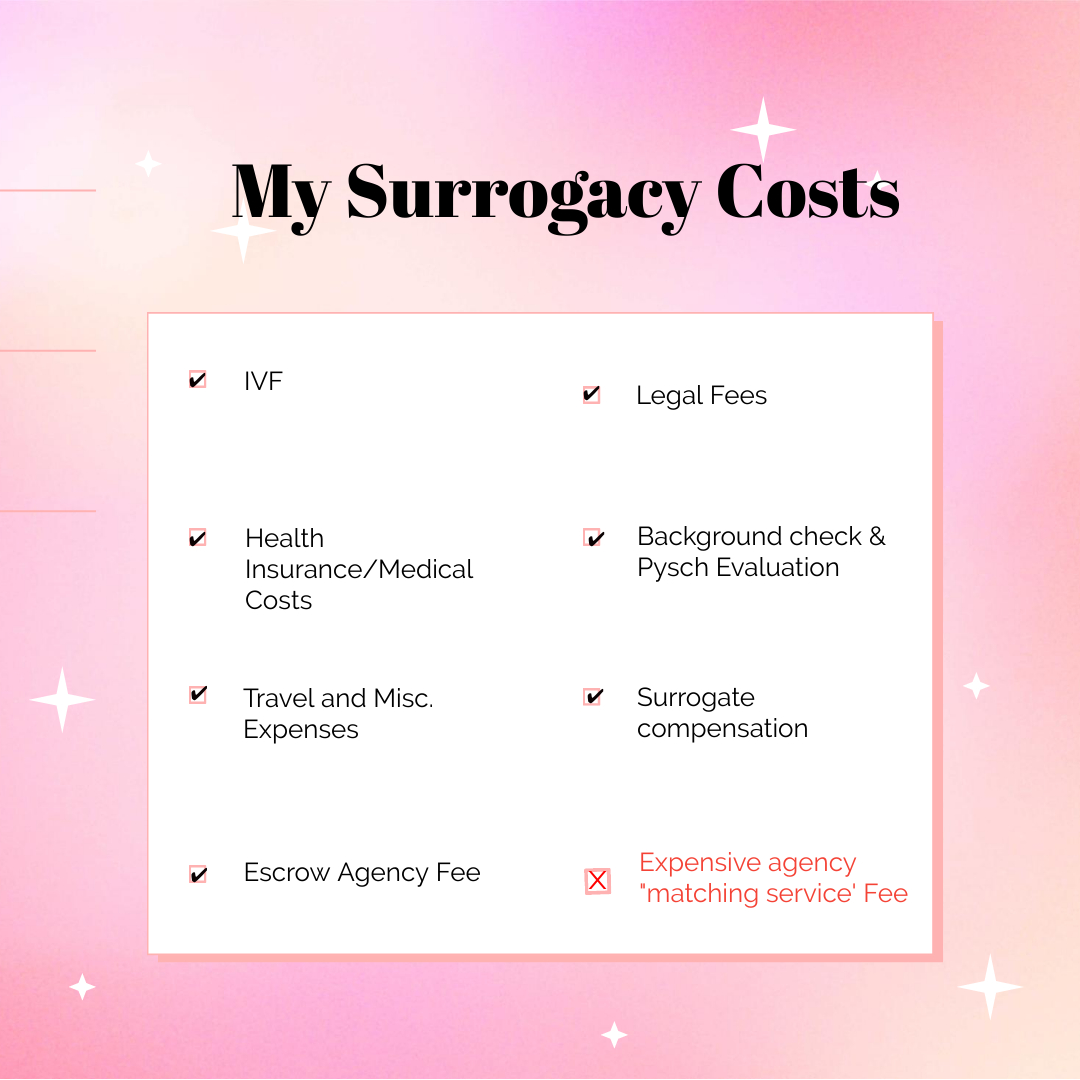When prospective parents, often called “Intended Parents” or “IPs”, begin researching surrogacy cost, it can be a daunting and confusing process especially when it comes to understanding all the potential expenses involved with assisted reproduction.
The following guide is a broad overview of some of the surrogacy costs that can be expected. With the exception of agency fees which are not paid when matches are done directly (e.g. through Surrogacyplace.com which is a self-matching site not an agency), most costs related to surrogacy are hard costs and are not optional.
It’s also worth mentioning that Independent journeys done without agencies can also be faster in terms of matching/availability of potential surrogates. People with means may find the concierge level of service an agency provides helpful, but it is also very possible, and in many cases preferred, to undergo a fully independent journey. Many surrogates prefer independent journeys as well, especially experienced well-qualified surrogates who know what they’re looking for and what requirements they want on their end. Many surrogates would rather the Intended Parents’ surrogacy budget go towards them and not siphoned off by expensive agency fees.
Here’s a rundown of some surrogacy costs Intended Parents can expect to encounter:
1. Legal Costs.
Intended Parent(s) and their chosen surrogate each need their own attorney. Intended Parents always cover the costs of the surrogate’s attorney and she must be at liberty to choose her own representation. There are also separate costs for Pre-Birth Orders in states that allow them. Pre-Birth Orders are a court mandate and are used to place the intended parents name(s) on the child(ren) birth certificate(s), and not the name of the Gestational Surrogate. Total legal costs can run on average between $5,000-$10,000.
2. Surrogacy Expenses and Compensation.
This includes transfer of embryo fee ($500-$1500 on average), base compensation ($25,000-$55,000 on average), general expenses (including a monthly allowance – $250-$500/month is typical), maternity clothes, and out of pocket expenses related to medical appointments. There are also twin/multiples fees ($10,000 generally), c-section fees ($3,000-$5,000), and lost wages if a surrogate takes time off work for medical reasons during pregnancy or for post-birth recovery when not covered by her employer. Often, a surrogate’s spouse will also receive lost wages if caring for a surrogate.
3. Escrow Costs.
An escrow company will usually handle payments to your surrogate. You can expect to put much if not all of the expected compensation and anticipated expenses in escrow. There are escrow companies that specialize in surrogacy such as SeedTrust. There are also journeys done without escrow, though those are very rare. This will cost around $2,000.
 4. IVF costs.
4. IVF costs.
In gestational surrogacy, these are the costs of creating and/or transferring an embryo. Intended Parent(s) pay for all of these costs, including medication and the hormones the surrogate is required to use. Surrogacy and IVF costs vary widely depending on the medical protocol, however most can expect to pay around $14,000-$20,000 out of pocket.
5. Medical Insurance/Expenses.
All non-IVF medical expenses for surrogacy are either covered by health insurance or out-of-pocket by the Intended Parent(s). If a surrogate has her own health insurance, it’s advisable that her plan be evaluated professionally by an organization like ART Risk to make sure surrogacy is covered and not excluded. No one wants surprise medical bills; complications, though less common for a medically cleared surrogate and especially with a single embryo transfer, can be in the tens of thousands if not hundreds of thousands of dollars. Complications do happen and Intended Parents need to be financially protected if they do. A surrogacy-friendly health insurance policy typically starts around $25,000-$40,000. Some Intended Parents prefer to match only with surrogates who have ART Risk-verified insurance.
6. Travel Expenses.
For IP(s) and surrogates as applicable. A surrogate’s partner or support person may need to travel as well.
7. Psychological Screenings and Background Checks.
Psychological screening are mandatory for first-time surrogates, but can be optional, pending legal approval in some locations, for surrogates who have done multiple prior journeys. Some surrogates also benefit from group or solo therapy sessions throughout the surrogacy journey. Expect to pay $1200-$2500.
8. Life Insurance Policy for Surrogate.
This is done to protect a surrogate’s family “just in case” since all pregnancies carry some risk, though regulated commercial surrogacy is especially designed to minimize and eliminate risk through rigorous medical screenings in the process of clearing a surrogate and managing her pregnancy. Generally a policy with a $250,000 benefit will cost between $600-$1000.
9. Agency Fee (optional)
An independent journey using a site like Surrogacy Place replaces the need for a surrogacy agency. Using this site, IPs and surrogates can match directly across a wide variety of matching points. If using an agency, however, expect to pay $20,000-$75,000 for their assistance in helping IPs find a surrogate.
All together, surrogacy journeys can cost anywhere from $60,000-$175,000. There are many factors at play including whether or not to use an agency, a current need for IVF vs. using an existing or donated embryos (or even undergo traditional surrogacy where allowed), and the base compensation expectation of the surrogate.
Cutting costs is not an option for surrogacy to be done in a safe, legal, and ethical manner designed to minimize risks. There is no cost cutting with the exception of not having to pay an expensive surrogacy agency to match you. Surrogacy laws are designed to protect surrogates and intended parents and it’s one of the reasons surrogates and intended parents have the best overall experience in places like the United States where commercial surrogacy is highly regulated with legal and ethical safeguards.
If you are doing an independent journey, your Assisted Reproduction Attorney will guide you on when and how to pay the various fees above. If using an agency, they will generally guide you while charging an extraordinary premium to do so.










